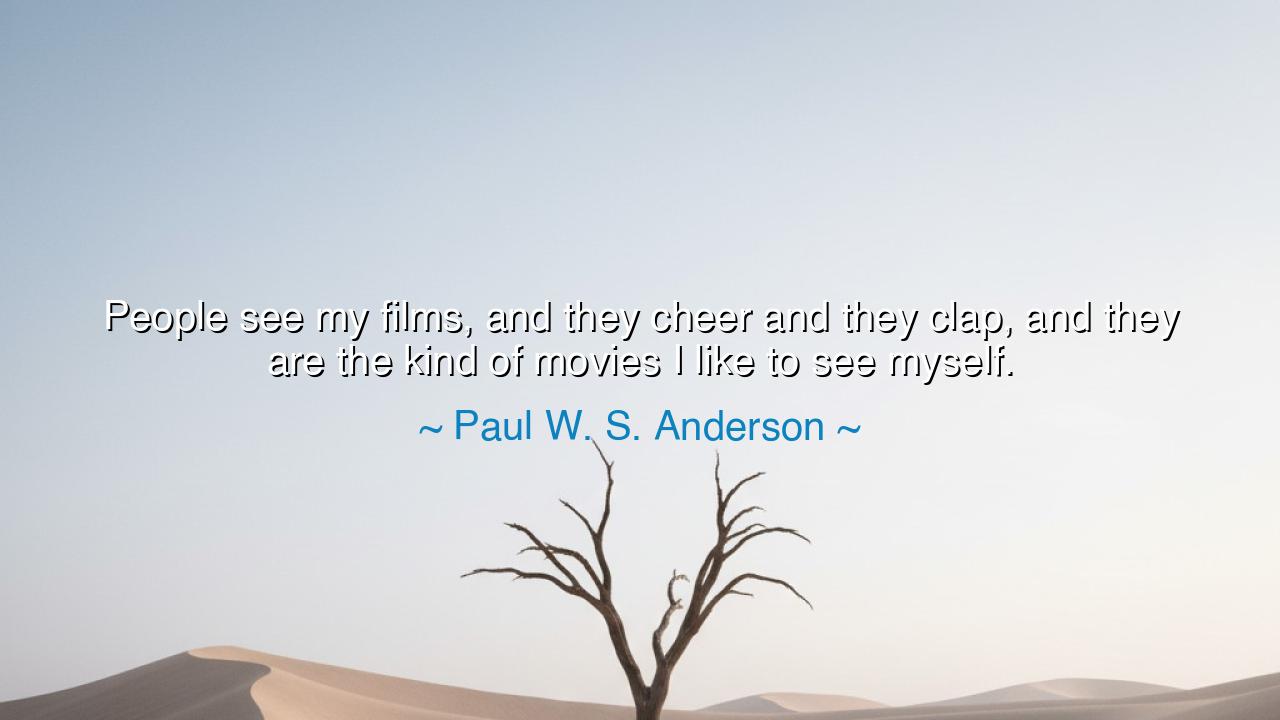
People see my films, and they cheer and they clap, and they are
People see my films, and they cheer and they clap, and they are the kind of movies I like to see myself.






Listen closely, O seekers of wisdom, to the words of Paul W. S. Anderson, who speaks with a deep understanding of the connection between creator and audience: “People see my films, and they cheer and they clap, and they are the kind of movies I like to see myself.” In these words, Anderson reflects not just on the nature of art, but on the deep bond between the creator and the work, a bond that resonates through time. The cheering and clapping of the audience are not just expressions of approval; they are the recognition of a shared experience, a moment of connection between the creator’s vision and the audience's soul. Anderson’s statement speaks to the heart of what it means to create—authentically, and in harmony with one’s own passions.
In the ancient world, the bards understood the importance of creating stories that reflected their own truths and visions. Homer, through his tales of Achilles and Odysseus, did not merely seek to please his audience; he sought to impart the truth of human struggle and fate. His stories were not just about entertainment, but about capturing the essence of the human condition. In the same way, Anderson’s films are not merely crafted for applause, but to speak to something deeper, to evoke a visceral, emotional reaction from those who view them. His films, like those of the ancients, serve not only as spectacles, but as vehicles for shared experiences that transcend time.
Consider, O wise ones, the example of Leonardo da Vinci, whose paintings, though masterpieces, were not solely created to receive praise but to express a vision of the world that was uniquely his. The Last Supper was not painted for adoration, but as a meditation on the sacred and the profound, a reflection of both divine and human nature. Anderson’s work, like da Vinci’s, does not come from a desire to cater to the masses, but from an inner vision that is deeply personal. He creates not for the applause, but for the joy of seeing his own truth reflected in the eyes of his audience.
In the same vein, we might look to Shakespeare, whose plays were filled with complex characters, moral dilemmas, and deep human truths. Though his works were performed for the crowds of Elizabethan England, they were never shallow entertainments. Shakespeare created works that were both deeply personal and universally resonant. He did not create for the sake of applause but to explore the very depths of human nature. His audience, just like Anderson’s, responded not only with cheers but with recognition—recognition of the truth and the humanity in the stories he told.
But there is a lesson in Anderson’s words for us all. In his statement, he reminds us that the highest form of creation is not in seeking to please others, but in staying true to oneself. To create something that you, as the creator, enjoy and believe in is an act of self-expression and honesty. For in doing so, you invite others to witness that same truth, and when they cheer and clap, it is not just for the work itself, but for the recognition of their own emotions, experiences, and desires reflected back to them. As Anderson points out, when we create what we love, we allow others to experience the same joy we felt in its making.
Reflect now, O seekers, on your own lives and creations. How often do you look outward, seeking approval or applause before embarking on your journey? Anderson’s words urge us to create for ourselves first, to be driven by our own passions and interests. Just as the ancients created their art not for the approval of others but to express the depth of their own hearts, so too must we embrace our own truths. When we create from a place of authenticity, others will find their own recognition within it, and the applause will come naturally, not as a goal, but as a response to the genuine connection we offer.
Thus, O future generations, let the words of Paul W. S. Anderson be a guide to your own creative journeys. Do not be swayed by the desire for external validation, but instead, create from the wellspring of your own soul. The works that endure and resonate with others are those that come from the deepest truth of the creator. Like the bards of old, like Leonardo and Shakespeare, let your work be born of your own vision, and in doing so, you will find a connection with others that transcends applause, touching the hearts of those who see your truth reflected in their own. Create for yourself first, and in that creation, you will build a legacy that speaks to the world.






AAdministratorAdministrator
Welcome, honored guests. Please leave a comment, we will respond soon